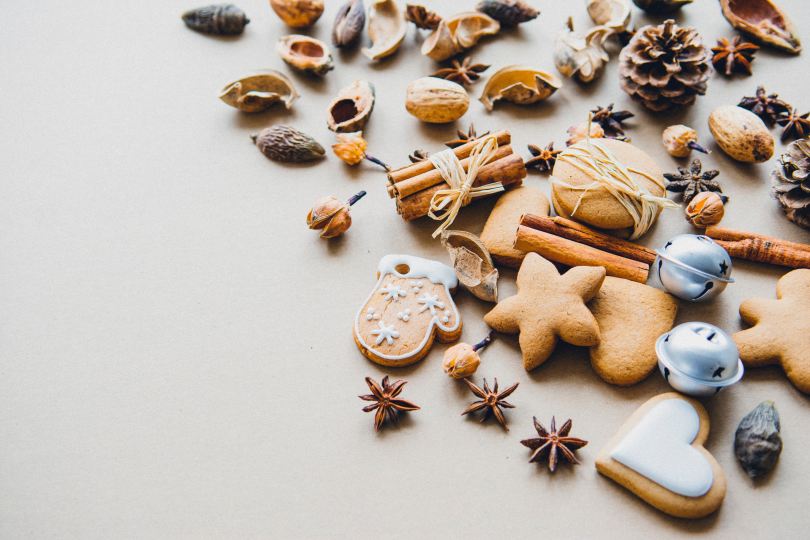
Reduce Christmas waste by finding your why
It’s the most w…asteful time of the year. While the Christmas season brings good cheers for most people, the environment is seriously affected by it. Households worldwide create 30 percent more waste over the winter holiday season. In the UK alone, 83 square kilometers of wrapping paper will be used. That’s enough paper to wrap the island of Jersey or stretch to the moon. Six million trees are thrown out after Christmas, and 125.000 tonnes of plastic packaging won’t be recycled.
The right mindset
Clare Osborn, Brighton-based life and sustainability coach, ocean advocate and founder of Clare Talks Rubbish, explains what you can do to reduce your waste this month. “The most effective thing to do is finding your why. If you want to make a difference and change your habits, you have to find your drive, your motivation. To me, that was the ocean and its majestic creatures. If you want to create a mindset in which change can happen, you should first acknowledge your concerns and worries regarding our planet. That makes it easier to create an actual plan with achievable goals. Start with one or two things that work in your life. And then, consider the planet. Start thinking about what you eat, how you travel, how you shop, and slowly change that.”
I miss my…thing
Once you have found your why, you can move forward to a low waste Christmas approach. “Shop locally and seasonally to start with. Make sure the meat, fruit, and vegetables you are buying haven’t traveled from around the globe,” Clare advises. “As for gifts: think before you buy. Where is that product going to end up after it has been used? How long is it going to be used for?” Clare is an advocate of gifting time. She strongly believes in gifting experiences instead of stuff. “I went traveling for about a year and a half, and I lived out of a bag. I didn’t sit there thinking: ‘oh I miss my…thing,’ who does that anyway? Lately, I went to a science event where a bunch of astronauts were being interviewed. They were saying that the last thing they think about in space is the stuff they have. It’s the people and experiences they miss.”
Kayaking home
Billions of Christmas cards end up in the bin after the Holidays. But Clare has a solution for that as well: “E-cards are amazing. I give a bit of money to a homeless charity instead of sending Christmas cards to everyone, although I still send an email with a personal message.” Besides cards, transport during Christmas is something to consider as well. You can get creative with your journey home. “I know people who ran, kayaked, or paddle boarded home.” Carpooling is an option as well to reduce your carbon footprint. Or use a sled. “Rather than four cars going up with one person in each.”
Memory tree
What about Christmas trees? “Having a reusable plastic tree is only sustainable when you keep it for ten years,” Clare explains. “Only then it has the same carbon footprint as a real one.” The best thing to do, however, is to grow and repot a tree. As for decorations, Clare has found a unique way to make her tree look amazing. “I collect local, handmade ornaments for my tree, from my travels. If you want a beautifully decorated tree, decorate it with memories instead of balls made in China. And avoid tinsel; it’s not recyclable.”
Climate emergency
Now the European Union declared a ‘climate emergency’, is aspiring a Christmas with less waste enough? “There is still a problem, but I feel positive that there a more people engaging with the solutions,” Clare says. “For me, plastic is a gate-way drug, so a lot of the solutions for plastic pollution problems are also the solutions for the climate emergency. We need to move away from fossil fuel, from a linear economy where we take, make and throw away, to a more circular system. Unfortunately, the focus is still on recycling. We need to rethink, reuse, redesign and repurpose things instead before we think about recycling.”
Importance of the ocean
The effect of Christmas waste on our oceans is often overlooked. “Eighty percent of the waste we find in the oceans comes from land-based sources. It gets into the oceans through rivers and wind.” To Clare, it’s principal to understand the importance of the ocean. “Not only our waste, but we are directly connected to the ocean. Every second breath we take, the oxygen is provided by the ocean. Fifty to eighty percent of the oxygen in the air is provided by the ocean. And there are new studies now that link mental health and wellbeing with connecting with water. Wallace J. Nichols, author of ‘Blue Mind’, wrote about it: ‘We are beginning to learn that our brains are hardwired to react positively to water, that being near it can calm and connect us, increase innovation and insight and even heal what is broken.’ Understanding how water, the ocean has health benefits for us as human beings,” Clare concludes, “will hopefully provide that motivation and emotion to want to protect it.”

Want to learn more? Visit Clare’s website or listen to her podcast. Merry Christmas!
Text: Roxanne Wellens



